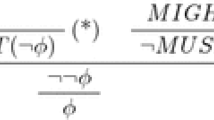Abstract
Schulz has shown that the suppositional view of indicative conditionals leads to a corresponding view of epistemic modals. But his case backfires: the resulting theory of epistemic modals gets the facts wrong, and so we end up with a good argument against the suppositional view. I show how and why a dynamic view of indicative conditionals leads to a better theory of epistemic modals.
Similar content being viewed by others
Notes
See Schulz (forthcoming), \(\S\)3 for details. As usual, ‘≡’ represents logical equivalence and ‘\(\bot\)’ stands for an arbitrary contradiction.
See, e.g., Adams (1975), Edgington (1995) and Barnett (2006). I follow the standard practice of wedding the suppositional view to conditional probabilities and a standard analysis of these probabilities. In principle, one may hold that conditionals are used to make conditional assertions but insist that they are evaluated by a different method. Such possible views—whatever they are—are not the target of my discussion.
This principle is just what Edgington (1995) calls ‘The Thesis’, but extended with the proviso that \(P (B\;{\mid}\;A)\,=\,1\) if P(A) = 0.
See Ramsey (1990) for details.
I set aside the suggestion that ‘If John is not in Chicago, then he must be in Boston’ is just equivalent to the plain ‘If John is not in Chicago, then he is in Boston’. This suggestion is poorly motivated since it is hard to see why must should add nothing to what is expressed by an utterance of (1a). Moreover, the argument against the widescoped analysis below also applies when we interpret ‘If John is not in Chicago, then he must be in Boston’ as a plain conditional. Hence we do not need to consider this suggestion explicitly.
Though Schulz does not explicitly consider examples such as (1a), the suggestions are in the spirit as well as the letter of his proposal. Schulz effectively admits that modals may scope over conditionals in footnote 9 of his article, and has no reason to deny that modals may scope over consequents.
What has been said about (2a) and (2b) applies to the the narrowscoped and widescoped reading of a sentence like ‘If John is not in Chicago, he might be in Boston’ as well. On the narrowscoped analysis, to utter that sentence is to conditionally assert that John might be in Boston under the supposition of his not being in Chicago. On this reading one should accept ‘If John is not in Chicago, then he might be in Boston’ just in case \(P ({\diamond}B\,{\mid}\,{\neg}A)\) is sufficiently high. On the widescoped analysis, an utterance of ‘If John is not in Chicago, he might be in Boston’ expresses non-zero confidence in ‘If John is not in Chicago, then he is in Boston’. On this reading one should accept that sentence just in case \(P (B\;{\mid}\;{\neg}A)\) is greater than zero.
To appreciate the full glory of a dynamic semantics for indicative conditionals, I recommend that you take a look at the letters of support from Gillies (2004, 2009, 2010) and Willer (forthcoming).
This is how Veltman (1985, 1996) treats epistemic modals, and dynamic theories of indicative conditionals owe a lot of inspiration to his work. Here the direction of inspiration is reversed: starting with a dynamic theory of indicative conditionals and a logical link between such expressions and epistemic modals, we have arrived at Veltman’s theory.
Things are even better than that since it is also easy to prove that \(A\;\vee\;B\;\therefore\;\neg A \Rightarrow \square B\) is dynamically valid. That makes perfect sense, as the following has the ring of intuitive entailment as well: I don’t know where John is, but he is either in Chicago or in Boston. So if he is not in Chicago, then he must be in Boston; and if he is not in Boston, then he must be in Chicago.
See Gärdenfors (1982), whose formulation slightly differs since he assumes that conditionalization is undefined if P(ϕ) = 0.
References
Adams, E. (1975). The logic of conditionals. Dordrecht: Reidel.
Adams, E. (1998). A primer of probability logic. Stanford: CSLI Publications.
Barnett, D. (2006). Zif is if. Mind 115(459), 519–566.
DeRose, K. (1991). Epistemic possibilities. Philosophical Review 100(4), 581–605.
Edgington, D. (1995). On conditionals. Mind 104(414), 235–329.
Gärdenfors, P. (1982). Imaging and conditionalization. Journal of Philosophy 79(12), 747–760.
Gillies, A. (2004). Epistemic conditionals and conditional epistemics. Noûs 38(4), 585–616.
Gillies, A. (2009). On truth-conditions for if (but not quite only if). Philosophical Review 118(3), 325–349.
Gillies, A. (2010). Iffiness. Semantics and Pragmatics, 3.
Groenendijk, J., & Stokhof, M. (1991). Dynamic predicate logic. Linguistics and Philosophy 14(1), 39–100.
Heim, I. (1982). The semantics of definite and indefinite noun phrases (PhD thesis, University of Massachusetts, Amherst).
Kamp, H. (1981). A theory of truth and representation. In: Groenendijk, J., Janssen, T., Stokhof, M. (eds.), Formal methods in the study of language, Part I (pp. 277–320). Amsterdam: Mathematisch Centrum.
Kamp, H., & Reyle, U. (1993). From discourse to the logic: Introduction to modeltheoretic semantics of natural language, formal logic and discourse representation theory. Dordrecht: Kluwer Academic Press.
Kamp, H., van Genabith, J., & Reyle, U. (2009). Discourse representation theory. Unpublished manuscript. http://www.ims.uni-stuttgart.de/~hans/Papers/hpl-drt.pdf.
Ramsey, F. P. (1990). General propositions and causality. In: Mellor D. H. (eds) Philosophical papers (pp. 145–163). Cambridge: Cambridge University Press.
Schulz, M. (forthcoming). Wondering what might be. Philosophical Studies.
Stalnaker, R.C. (1978). Assertion. In: Cole, P. (ed.), Syntax and semantics 9 (pp. 315 – 332). New York: New York Academic Press.
Veltman, F. (1985) Logics for conditionals (PhD thesis, University of Amsterdam).
Veltman, F. (1996). Defaults in update semantics. Journal of Philosophical Logic 25(3), 221–261.
Willer, M. (forthcoming). New surprises for the Ramsey test. Synthese.
Acknowledgments
For comments, I would like to thank Nicholas Asher, Josh Dever, Hans Kamp, Mark Sainsbury, and an anonymous Philosophical Studies referee.
Author information
Authors and Affiliations
Corresponding author
Rights and permissions
About this article
Cite this article
Willer, M. Realizing what might be. Philos Stud 153, 365–375 (2011). https://doi.org/10.1007/s11098-010-9514-3
Published:
Issue Date:
DOI: https://doi.org/10.1007/s11098-010-9514-3



